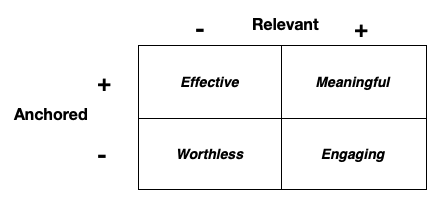 I was asked to go to read an article and weigh in. First, please don’t do this if you don’t know me. However, that’s not the topic here, instead, I want to comment on the article. Realize that if you ask me to read an article, you’re opening yourself up to my opinion, good or bad. This one’s interesting, because it’s both. Then the question is how do you deal with good and bad advice all in one.
I was asked to go to read an article and weigh in. First, please don’t do this if you don’t know me. However, that’s not the topic here, instead, I want to comment on the article. Realize that if you ask me to read an article, you’re opening yourself up to my opinion, good or bad. This one’s interesting, because it’s both. Then the question is how do you deal with good and bad advice all in one.
This article is about microlearning. If you’ve been paying attention (and there’s no reason you should be), I’ve gone off on the term before. I think it’s used loosely, and that’s a problem because there are separate meanings, which require separate designs, and not distinguishing them means it’s not clear you know what you’re talking about. (If someone uses the term, I’m liable to ask which they mean! You might do the same.).
This article starts out saying that 3-5 minute videos are not microlearning. I have to agree with that. However, the author then goes on to document 15 points that are important about microlearning. I’ll give credit for the admission that there’s no claim that this a necessary and complete set. Then, unfortunately, I also have to remove credit for providing no data to support the claims! Thus, we have to evaluate each on it’s own merits. Sorry, but I kinda prefer some sort of evidence, rather than a ‘self-evident’ fallback.
For instance, there’s a claim for brevity. I’ve liked the admonition (e.g. by JD Dillon) that microlearning should be no longer, and no shorter, than necessary. However, there’s also a claim here that it should be “3 – 10 minutes of attention span”. Why? What determines this? Human attention is complex, and we can disappear into novels, or films, or games, for hours. Yes, “Time for learning is a critical derailer”, but…it’s a factor of how important, complex, and costly if wrong the topic is. There’s no one magic guideline.
The advice continues in this frame: there’re calls for simplicity, minimalism, etc. Most of these are good principles, when appropriately constrained. However, arbitrary calls for “one concept at a time is the golden rule” isn’t necessarily right, and isn’t based on anything other than “our brains need time for processing”. Yes, that’s what automation is about, but to build chunks for short term memory, we have to activate things in juxtaposition. Is that one concept? It’s too vague.
However, it could be tolerated if some of the advice didn’t fall prey to fallacious reasoning. So, for instance, the call for gamification leans into “Millennials and Gen Z workforce” claims. This is a myth. Gamification itself is already dubious, and using a bad basis as an assumed foundation exacerbates the problem. There are other problems as well. For one, automatically assuming social is useful is a mistake. Tying competition into the need to compete is a facile suggestion. Using terms like ‘horde’ and ‘herd’ actually feels demeaning to the value of community. A bald statement like “Numbers speak louder than words!” similarly seems to suggest that marketing trumps matter. I don’t agree.
Overall, this article is a mixed bag. So then the question arises, how do you rate it? What do you do? Obviously, I had to take it apart. The desire for a comment isn’t sufficient to address a complex suite of decent principles mixed up with bad advice and justified (if at all) on false premises. I have to say that this isn’t worth your time. There’s better advice to be had, including on microlearning. In general, I’ll suggest that if there’s good and bad advice all in one, it’s overall bad. Caveat emptor!






